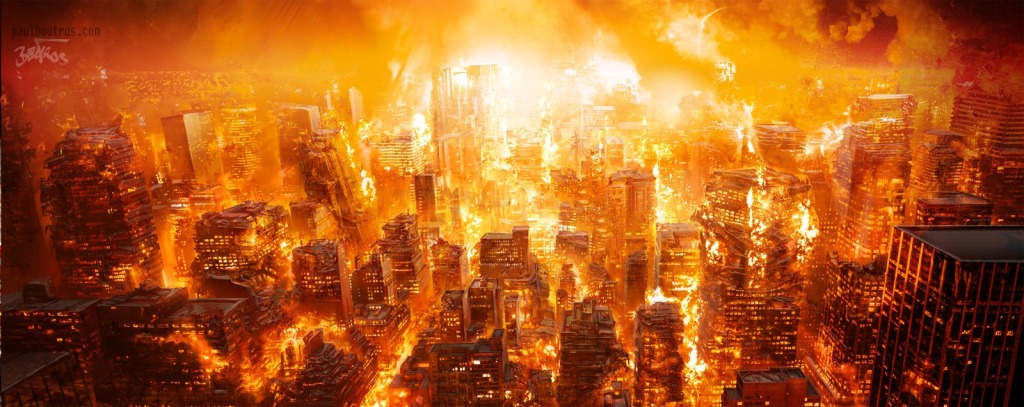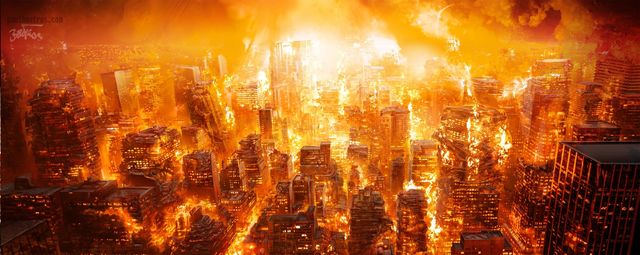Let justice descend, O heavens, like dew from above, like gentle rain let the skies drop it down.
Let the earth open and salvation bud forth; let justice also spring up!
Isaiah 45:8
I had an interesting insight during morning prayer as I read this passage. One of the occupational hazards of being human, I suppose, is being distracted in prayer. One of the occupational hazards of being a military man is being distracted by a preoccupation with combat. So I had to pull myself back from mentally designing a rifle and pistol training event that I want to set up, to get back to the Divine Office. And when I came back in to read it, it was this passage from Isaiah.
When I read that, I had the image of myself standing outside of a very large burning building. I had a tin can full of water in my hand and I wanted to put the fire out but all I had was a tiny little tin cup of water. I was ready to throw that little bit of water on the fire solely as a gesture knowing that it wouldn’t accomplish anything. And then water came down from the sky, as a dew, or is a gentle drizzle, and slowly began soaking the burning timbers until eventually, after a couple of hours, the fire was extinguished.
It is an image, and like all images it is a way of suggesting the truth too complex to be apprehended logically, but graspable intuitively.

Sometimes it seems to me that the world is on fire. Recent events in Berlin, Turkey, and Syria have reminded me, as if I needed any reminding, but the world is a dangerous place, full of hatred and violence. My response to the reality of violence has always been on the one hand to seek peace in my own life, but on the other hand to pursue what I call the Way of Training. By this I mean disciplined, consistent, long-term pursuit of the skills and abilities necessary to confront violence directly. These include, of course, combat skills, but also medical skills. In the simplest terms, not much has changed since I was a little boy and all of my games revolved around stopping the bad guys and healing the good guys. Life is not that simple, but that’s not a bad place to start.
The problem is that it’s so overwhelming sometimes, and we risk being like the me in the image, roaming around a burning building, or even a burning city, with my little cup of water, unwilling to keep that water to myself and not do my bit, but also not knowing how to spend that water in a way that will actually do some good, and not just be a waste of gesture.
I suppose my tin cup of water is my history of, and familiarity with, the use of force. Perhaps in a broader sense that represents all of the decent, honest, hard-working warriors in the world: military folks and police officers mainly, but a few private citizens in their own right. We all want to stop the burning, and just make the world a safe place for innocent people, but no matter how many times and how many places we put the bad guys down, more just pop up somewhere else.
It’s important to remember that the use of force, and in fact all human effort, but most especially effort centered around military options in the force of arms, are not and never can be final solutions. They are stopgaps. Only and ever stopgaps.
I am not sure that I want to call the grace of God a “final solution,” since that phrase tends to reduce complexity of the fallen world to some sort of advanced math problem. However, the image of dew, or gentle rain fall, is a hopeful one. The water forms in the air in a million tiny little droplets. Unlike water splashed on from the outside, the rain forms within the heart of the fire. At first it seems like it has no effect because the heat just vaporizers it as it falls. But even the vaporized water goes back up into the clouds, cools again, and falls again. Each time the waterfalls and his vaporized it absorbs a little bit of the heat from the fire, and it burns that much cooler. Eventually, slowly and after an agonizingly long time, The fire is reduced to smoldering ruins. Then eventually even the smoldering embers are reduced to ashes, and the ashes become fertile soil, and something new grows in their place.
How is that hopeful? Am I basically saying not this world is lost and there’s nothing we can do but wait for God to come in and magically make everything all right? No.
I think it is about having a realistic, by which I mean humble, understanding of my own place in this fight. Putting out the fire is not my job. My job is to salvage what I can. Perhaps that means just keeping the walls of one little house damp, so that it doesn’t go up in flames. Perhaps it means putting out one little fire in one little back alley so that somebody can escape to safety. It means that I must be active in resisting the fire, but not settle myself with the expectation of putting out the whole burning city myself.
There is one other thing that may be drawn from this image, if I’m not stretching the analogy too far. I only have a little bit of water, and if I splash it on the first conflagration I come across, it will not put it out and I will be left dry. I don’t think that I need to use it sparingly, but I do need to have a good resupply plan. That is, I need to maintain contact with the source of that water.
Nietzsche had a quote to the effect that, “He who fights monsters should see to it that he does not become a monster himself. If you stare too long into the abyss the abyss stares back into you.” It is too easy to get sucked into the pattern of the violence that you’re trying to resist, especially if you lose contact with the source of the water. This is why the heart of all apostolate is contemplation. The temptation for well-meaning Catholics is often to focus on social justice and charitable action so feverishly that we lose, or let go of, the time for prayer. This may achieve some short-term gain but it never lasts long, because once you stop praying you are cut off from the source of all water. Being too busy for prayer is like a firefighter being too busy to hook the hose up to the fire hydrant.





